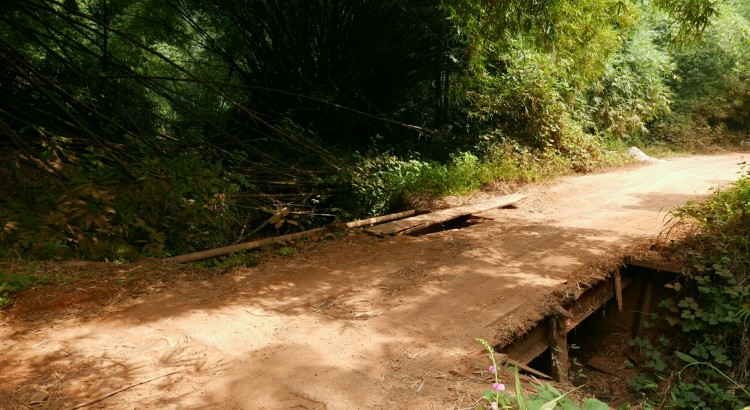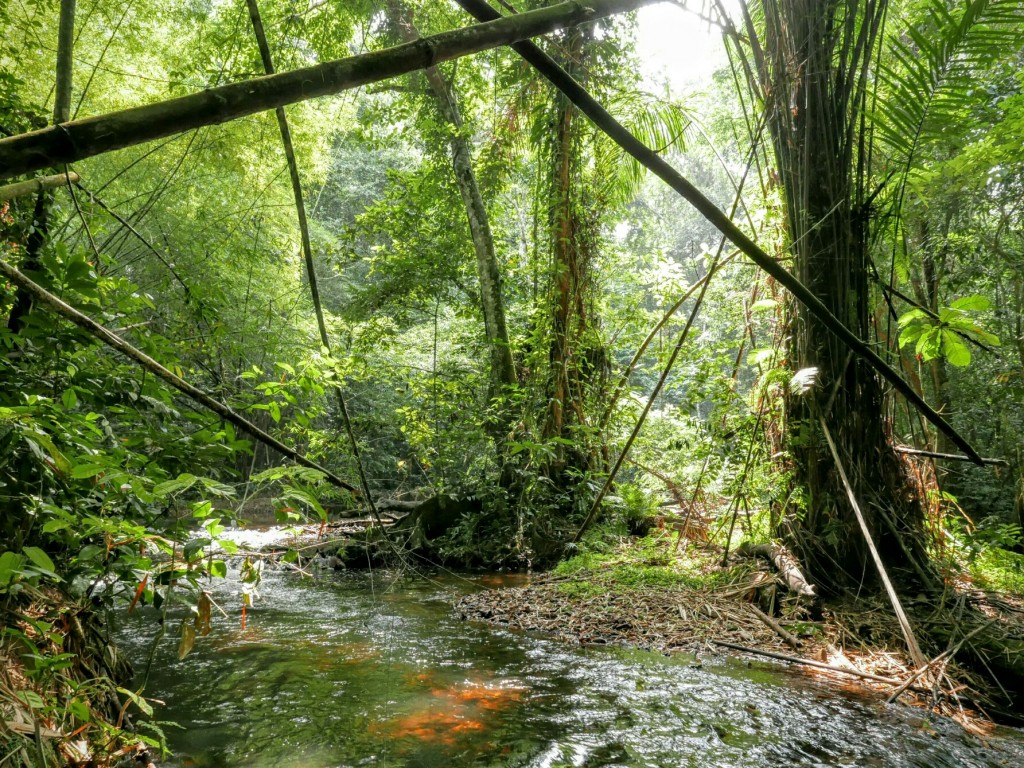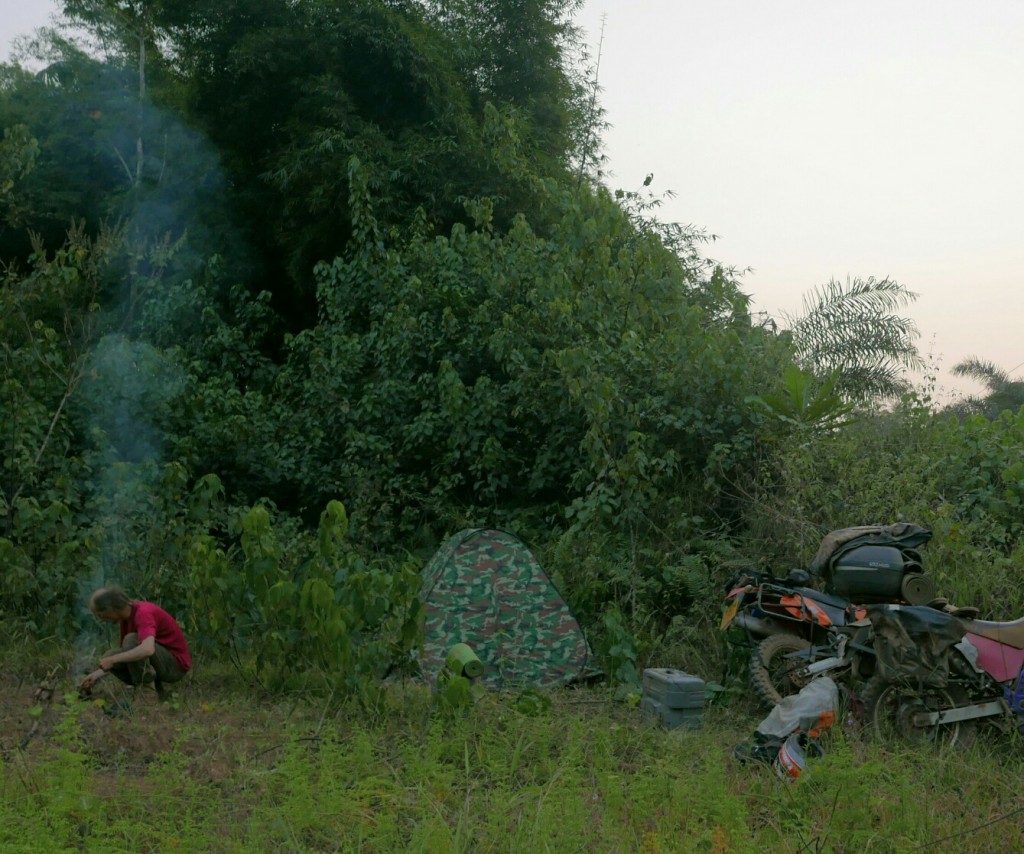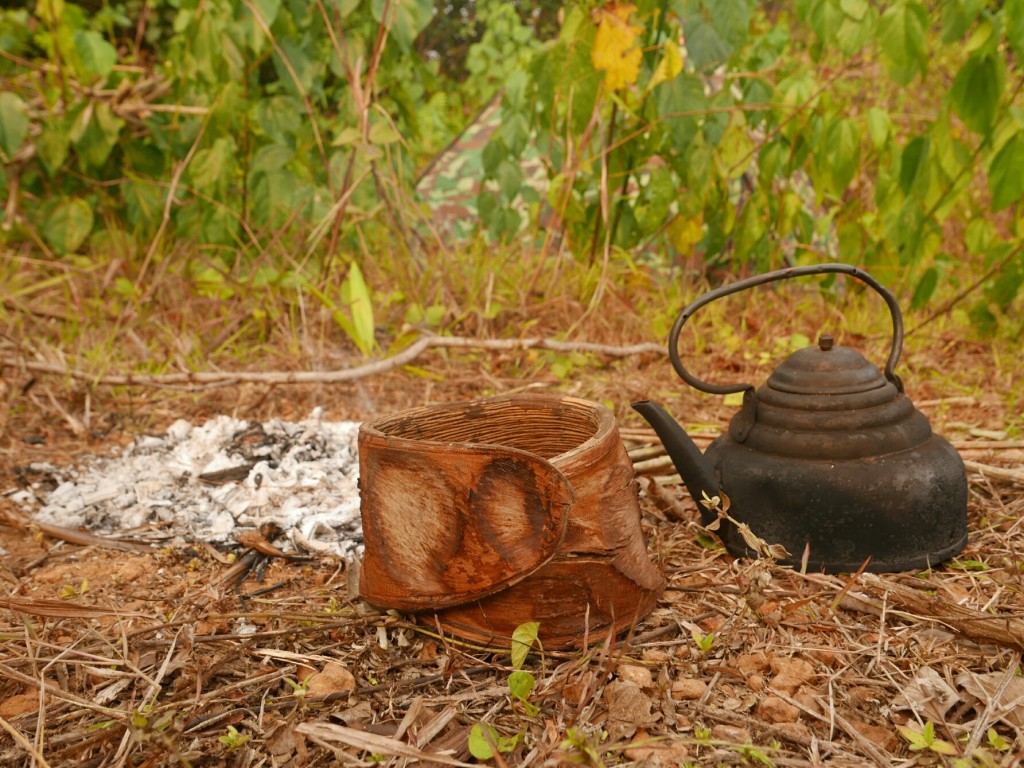The road south from Yaounde towards Gabon is spotless tarmac – national road #2. Before Gabon border at Ebowala we turn west onto national road #17, which is nothing more than a dirt path leading into the rainforest. That dusty and lumpy path is 170km long and ends on the coast in Kirbi. 20km in I lose Juka’s headlight in the mirror. Instead there is a slightly bigger cloud of dust. As the dust settles, I can see Juka pulling Suusi out of a 1m deep trench, where he had crashed in the middle of the road and once I get back there he is surrounded by about 20 villagers, all talking something, but the only thing I understand is “whisky”. Initially I thought they were joking about my brother being drunk, but I later realised they were sure we were carrying whisky and wanted some for themselves.
We find a smaller path heading into the jungle just between villages and set up camp on an opening. While we’re looking for firewood, a dude emerges from the bush loosely dangling a machete in his hand. He is incredibly happy to see us, pleads respect for “touristique vie rural” and invites us over to the village to meet his friends and family. We take a “rain check” and he offers to help with his machete to chop us some firewood. The machete is like an extension of a right arm for villagers here, you can see 7 year old kids walking home from school casually carrying a machete which would reach the ground if the kid stretched his arm in full. Later on as the night falls and we can hear imaginary lions walking behind the tent we wish we had one extension like this at hand too.
The folks are friendly here. I could imagine if two Cameroonian lads were camping on a field near Áksi village in homely Estonia, then the villagers would be panicing and sending a few men with shotguns to sort them out.
The first thing you do when entering a new country in Africa is getting a local sim card. €0.75 gets me 500mb of 3G for 24h. The cities are covered with HDSPA although the internet is quite slow, the rural areas are covered with EDGE. The telcos have to identify you when you register the SIM. Fortunately a copy of my passport worked, but I also needed to sketch a little map of where I live – we agreed with the sales lady that I should live in a Hilton in Yaounde and copied the map from Google. Streets often don’t have names and places are addressed as “that junction” – once you’re there you should just ask people.
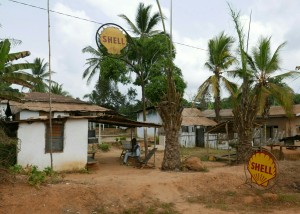 Fuel is expensive here – €1 compared to €0.40 in Nigeria, but food is pretty cheap. €1.5 for 3kg of tomatoes, €0.10 for a kg of bananas, a meal of rice and fish stew with a soft drink comes around €1.5 in a clean shed-restaurant.
Fuel is expensive here – €1 compared to €0.40 in Nigeria, but food is pretty cheap. €1.5 for 3kg of tomatoes, €0.10 for a kg of bananas, a meal of rice and fish stew with a soft drink comes around €1.5 in a clean shed-restaurant.
As there is no coverage in the jungle and we cannot find answers to our questions on Wikipedia, we spend a lot of the evening enjoying the night orchestra of the jungle and guessing answers to the following important questions. Why do frogs make that loud noise all through the evening, they can’t be mating every night of the year and it doesn’t make sense that they sing just because they’re happy like Pharell. Where does all the red earth come from and why is it red? Is it the vegetation here, which decomposes into red clay instead of black soil that we’re used to? How to fight a hungry lion? … and so on.
We find the dried shells of giant beans, which make great firewood. It is harder to start a fire in the jungle than we thought, nothing is dry. The teapot started travelling with us first in Africa in 2002, then served us well in 2009 and keeps making delightful tea.
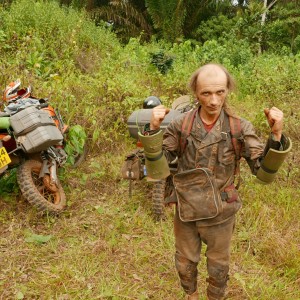 After dropping his bike for the 3rd time and scratching the same elbow, Juka starts thinking of protection and turns a party if his sleeping mat into elbow shields.
After dropping his bike for the 3rd time and scratching the same elbow, Juka starts thinking of protection and turns a party if his sleeping mat into elbow shields.
It is a bit daunting that we still have 150km of that same dirt track to go. Google maps shows another tiny path through the natur reserve in the south, but given the shape of that national road that we’re on, I doubt we’ll be able to take that other road back. We’re thinking maybe to try and see if we can get a visa to Equatorial Guinea on the border, so we don’t have to come back on the same road. There is only one tiny problem, there is a river between the two countries and no bridge.
